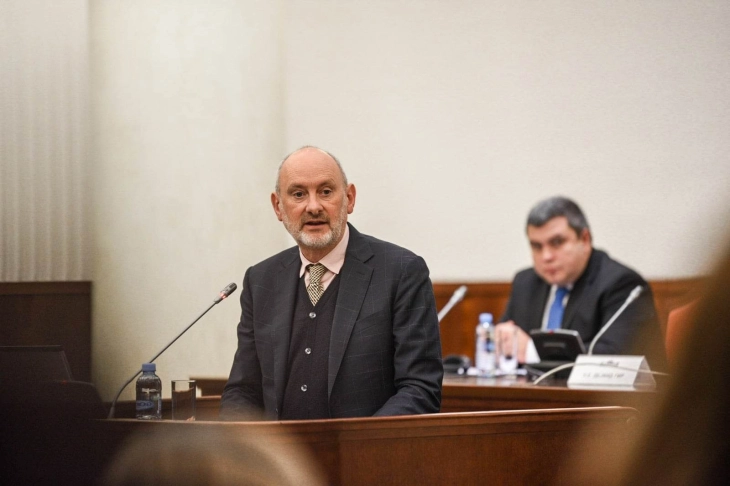Geer: Period until next elections in 2024 to be used for essential reforms
- North Macedonia in 2023 has to focus on reforms that serve the interests of the citizens. The path forward, the pace of the reforms and progress towards the EU depends on you now. Now is the

Skopje, 9 January 2023 (MIA) – North Macedonia in 2023 has to focus on reforms that serve the interests of the citizens. The path forward, the pace of the reforms and progress towards the EU depends on you now. Now is the time to build on the momentum of the beginning of negotiations in 2022. The period from now until the 2024 elections should be used to carry out the much-needed reforms, said EU Ambassador to North Macedonia, David Geer, at a session of the National European Integration Council in Parliament on Monday, at which Swedish Ambassador Ami Larsson Jain presented the priorities of the Swedish Presidency of the EU Council.
Geer underscored that 2023 will be a decisive year for the EU, the Western Balkans and North Macedonia.
“The rule of law is of crucial importance. This was the particular focus and concern of the citizens in 2022. The EU member states and other partner countries spent millions in this sector therefore it is fair to expect certain results from it. North Macedonia needs a professional and independent judiciary and prosecution. People who act with integrity and are free from political pressure or financial incentives. The fight against organized crime and corruption should be a priority as well. It should receive additional impetus because the EU will closely monitor the development of events in this area – in the area of fundamentals from the first to the last part of the process. Of course, it is the government that is leading this process, but Parliament is also at the core of the process,” said Geer.
He stressed that the opposition should play its role in simultaneously reviewing the policies and ensuring that the legislation is consistent with the EU acquis.
“EU integration requires full commitment. The government, Parliament, the institutions, and all political actors and the civil society should work together to make progress in the EU reforms as a national project. This process is about taking practical reform steps one by one, which includes working together to reach the common positions of the Constitutional Court, the audiovisual sector, the Deputy Ombudsman and a whole series of laws which are necessary for the reforms in these sectors to move forward immediately,” Geer underlined.
The EU Ambassador reiterated that the path towards EU membership will not be easy.
“But you have already started with reforms in key areas, and in some areas, you are ahead of other countries, ahead of European countries. The constitutional amendments to include the citizens who consider themselves as Bulgarian to the Constitution remains a sovereign decision of North Macedonia, but its fulfillment is necessary to maintain the momentum in negotiations. It is a decision that doesn’t depend on anyone else but you,” Geer said.
The EU Ambassador emphasized that becoming an EU member does not mean losing your national identity.
“The recently signed Frontex agreement is proof of that. This agreement brings security to your borders, while at the same time being the first agreement between North Macedonia and the EU signed and translated in Macedonian and all other 24 languages of the EU. Yes, it is difficult, but the situation can be overcome and several countries from the regions have shown that this is possible. Be assured that the EU stands firmly with North Macedonia on every step of its path to the EU. We will face all possible challenges together,” said Geer.
Geer reiterated that this year will not be a usual year for Europe, the Western Balkans and North Macedonia.
“As a country, North Macedonia has shown exceptional leadership in terms of the situation in Ukraine, and has fully aligned itself with EU policy on this issue, which also includes the implementation of sanctions for those responsible for this war,” said Geer.
He extended his congratulations to North Macedonia for assuming its OSCE Chairpersonship, and stressed the consequences of the war in Ukraine and the support which the EU has provided.
“The Russian war in Ukraine created great challenges for us especially in the field of energy and food supply, causing an increase in the prices and we are all actively working together to control the situation. The EU was the first to support the country and the region, and we will provide an additional 18 million euro in 2023 to that end. Almost half a billion euro will be provided for the Western Balkans as a whole in order to help the region face the challenges such as the green transition, climate change and we will continue to work together on these issues,” said the EU Ambassador.
In 2022 the events in Ukraine were reflected throughout the region, added Geer, and they highlighted what we value the most – peace, democracy, freedom, international cooperation, and progress through multilateralism based on an international system, and not the doctrine that might makes right. ad/sk/







